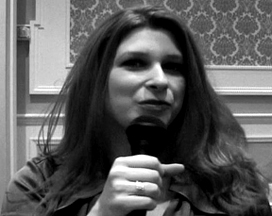Welcome Love was released in 1997. Lilly and I had our first child and another was on the way. Events you might think would reflect positively in my songwriting actually had the opposite effect. Between 1997 and 2000 I wrote approximately 50 songs and most of them are anything but cheery. Though the bleakness is occasionally lightened by a little comic relief, all in all, there’s a somber quality throughout.
I had started doing shows on a fairly regular basis. Being a solo act that didn’t fit into a viable commercial mold, I never drew any significant crowds. Despite this, I continued to seek bookings and get them. The venues were usually Indie clubs or coffee shops; places that accepted someone performing original music. To supplement my paltry audience I occasionally lined up additional acts for shows. This meant that the nominal fee paid by the club – if there was any – was further cut back when divided between myself and the other performers.
Around this time that I began to notice something about my standing in local music. While continuing to get good reviews for releases and actively performing at a variety of venues, the majority of the music community itself was never accepting of my work or, in truth, of me as a performer. Artists notice the most insignificant of slights but when friends and acquaintances start to ask why you were not included in this show or why you were not mentioned in that article or why your songs weren’t on this or that CD compilation of regional music you sense a pattern emerging. The situation only worsened due to the following odd set of circumstances.
Zinzinnati Zelda was a music superfan who had started an on-line interview blog for local musicians after being laid off from a horrendously bad Rock radio station here in town. She wrote the questions, sent them to the interviewee and they responded with the answers. The blog had been active for a few years but, true to form, I was never asked to contribute. I wrote to her about it and she agreed to interview me which, in itself, came as something of a surprise. The questions she sent were typically inane and designed to elicit equally inane answers. I believe humor was the intended purpose. A couple of them, however, were a bit more serious.

Zinzinnati Zelda
One question sought my opinion on what might improve local Indie Music. I told her that Indie musicians seemed far too myopic and would be better served if they broadened the types of music they listened to. She also asked for my views on the quality of local radio stations. The best station in town at the time was WMKV. Broadcasting from the Maple Knoll Village Nursing Home, they played Swing Era Jazz without interruption of any kind. It was here that I had first heard the immortal Boswell Sisters, among many other outstanding artists. In addition to this, I added that the two local NPR stations – WUCK and WHEY – were particularly bad. I also mentioned something about them playing far too much boring hippie music and that the only thing worse than a hippie is an aging hippie.
Everything seemed fine once the interview was posted. A week or so later my wife ran into Jane, an old band mate of hers and an extremely strident member of the Indie community. Jane proceeded to tell her how upset everybody was about my comments. By “everybody” she meant her Indie pals because, as a rule, those outside the Indie clique were comparative nobodies. She said people thought I was an asshole. To her credit, Lilly called me on it but, in the end, laughed the whole thing off.
A few months later I was having a drink at Wormwood, an Indie bar I had played numerous times, when Rob Phyllis (aka Mrs. Phyllis, the DJ from WUCK [see chapter 13]) walked in. In his typically disheveled, loping way he sat down next to me and ordered a Red Stripe. I asked him how he was doing and he said, “I’m okay.” He paused a moment and then asked, “You know that interview you did with Zelda?”
I looked at him questioningly.
“Well,” he continued, “Jack (the program director at WUCK [see chapter 13]) read it and he fuckin’ lost it. He confronted me in the hall the other day and said if I ever have you on the show or play any of your shit again I’d get fired. He dragged me with him down to the station’s record library, had me pull out your CDs and he threw them all in the trash. He said you’re totally banned from the station.”
I asked for a few details but it didn’t really matter. Not only were my CDs banned, since WUCK sponsored a lot of the regional music festivals, I was effectively eliminated from consideration for any and all of their upcoming events. A couple of years after this, Mrs. Phyllis once again had me on his show on the condition that I would apologize for what I had said about the station. Apparently, my half-hearted comments in this final appearance weren’t good enough because, sometime later, when dropping off yet another new release, he told me that my music was still banned. I didn’t spend much time mulling the situation over. My experiences with WUCK had never been pleasant and this seemed a fitting end to our relationship.
<<< Continue reading >>>
<<< Read the previous chapter
© 2014 by Maurice Mattei
All rights reserved.